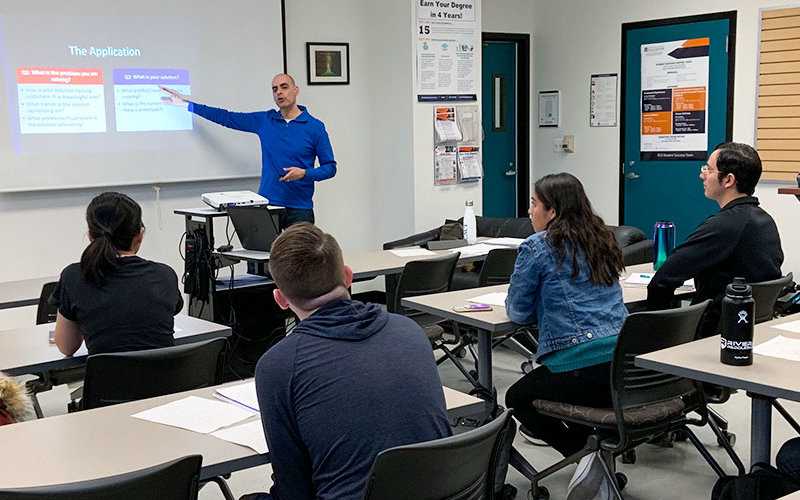
With his acumen in engineering and business, Atul Teckchandani is helping to guide engineering and technical students in their entrepreneurial pursuits.
With degrees in both disciplines, Teckchandani is the perfect fit to become the first Entrepreneur in Residence in the College of Engineering and Computer Science. He started his new role this academic year with a goal to foster students who want to create and improve products and services, grow businesses and become successful in their careers — even if they don’t end up becoming entrepreneurs.
While the mission of the college is to educate engineers and computer scientists to become successful in their careers, equally important, is helping students develop an entrepreneurial spirit, said Susan Barua, the college’s dean.
“Dr. Teckchandani provides the much needed support and guidance to students to develop the entrepreneurial mindset and help them to transform their ideas into start-ups or marketable products,” Barua added.
Teckchandani, associate professor of management in Mihaylo College of Business and Economics, partners with ECS college faculty members to bring entrepreneurial-themed content into the classroom and meets with students individually about their big ideas and products.
He also organizes workshops for students, such as how to pitch ideas, how to assess the real-world potential of their senior design project or how to show potential employers they have an entrepreneurial mindset. For students wishing to participate in entrepreneurial contests, such as CSUF’s Startup Competition and Fast Pitch Competition, Teckchandani mentors and prepares them.
Another plus for engineering and computer science students, is they can enroll in the upper-division entrepreneurship courses “New Venture Creation” and “New Venture Launch” for credit.
What is your role?
My role is to encourage engineering and computer science students to think more like entrepreneurs. That means that they should be thinking about creating something that solves a meaningful problem for customers and building the product with customer input at every step.
Why is it important for students to learn about entrepreneurial know-how?
Engineering and computer science students are technically very strong, and by the time they graduate, they have a solid understanding of fundamental engineering concepts. This sets them up to do very well as they start their professional careers. To help them do well in the long-term, they need to be able to be seen as someone who can come up with ways to improve a company’s current line of products and create new products to help the company grow.
What skills are students taught?
I share with students the importance of understanding that entrepreneurs do not create products — they solve problems and seek to make things better in a meaningful way. I also show them how to determine what problems to solve by understanding their customer, including their hopes, fears, frustrations and the market. This understanding is vital to coming up with new products or new features for existing products. Students also learn how to get things done using the resources they have available and brainstorm with colleagues to come up with new product ideas.
What are students most interested in learning?
The most common question I get asked is: ‘How do I get money for my start-up idea?’ Most new ventures are funded by the company’s founders or their friends and family members. For a new venture to get money from an outside investor, it has to show concrete evidence that what they are building is valued by customers and appeals to a large number of customers. I tend to focus on how students can build prototypes quickly and cheaply, so that they can obtain this evidence.
What are your goals for students?
My main goal is to help students become the kind of people who are valued by their employers for their technical skills and entrepreneurial mindset. In other words, they are the ones who are seen as the company’s future leaders. For students who are looking to launch new ventures while they are in school or immediately when they graduate, my goal is to provide them with resources to support their efforts. For me personally, what’s most rewarding is seeing all of the tremendous projects that students are creating, and working with them to develop them further. When I hear students telling me about how people can benefit from what they are creating, it makes me smile.
Contact: Debra Cano Ramos, dcanoramos@fullerton.edu